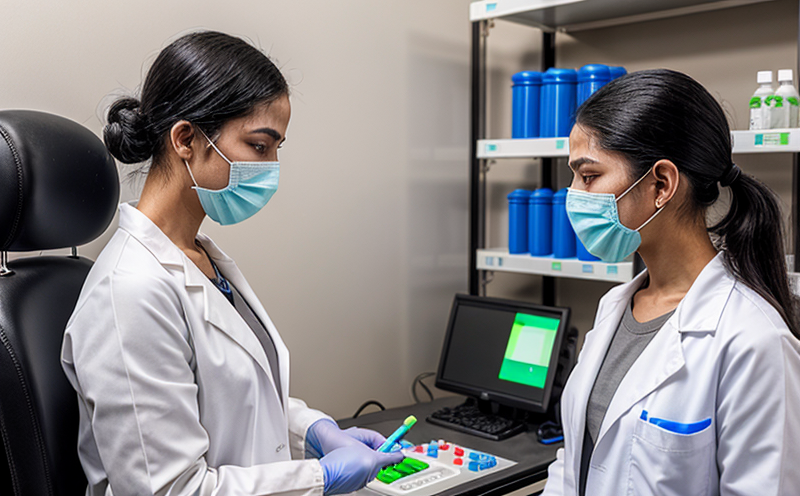In Vitro Aneugenicity Testing
Understanding and ensuring the safety of pharmaceutical products is a critical responsibility for any organization involved in drug development. The In Vitro Aneugenicity Test evaluates the potential genotoxic, carcinogenic, and mutagenic effects that certain compounds or pharmaceuticals might have on living cells without the need to expose animals to these agents. This test plays an indispensable role in complying with regulatory requirements set by bodies such as the European Medicines Agency (EMA), FDA, and others.
The In Vitro Aneugenicity Test assesses chromosomal alterations that may lead to aneuploidy, a condition where cells have an abnormal number of chromosomes. This test is particularly useful for identifying potential risks during early drug development stages, thereby helping pharmaceutical companies to make informed decisions about which compounds proceed to further testing or clinical trials.
The choice between using in vitro and in vivo models often hinges on ethical considerations as well as practical efficiency. In vitro methods offer several advantages over traditional animal-based tests: they are faster, more cost-effective, and provide a more precise evaluation of the potential impact of a compound on human health. By employing state-of-the-art laboratory equipment and adhering to stringent protocols, we can ensure that our testing is both reliable and compliant with international standards.
The test involves several steps:
- Selection of appropriate cell lines
- Culture and treatment of cells with the compound or pharmaceutical in question
- Induction of micronuclei formation through exposure to known aneugens
- Use of fluorescence in situ hybridization (FISH) techniques to detect chromosomal aberrations
The data gathered from these tests provides valuable insights into the potential genotoxic effects, allowing for better-informed decisions about product safety. This approach not only enhances our understanding but also supports regulatory compliance.
| Stage | Description | Outcome |
|---|---|---|
| Preparation and Induction | Culturing cells, treating with the compound, and inducing micronuclei formation. | Cells are ready for analysis. |
| Analysis Using FISH | Detection of chromosomal aberrations through fluorescence in situ hybridization. | Data on potential aneugenic effects is collected. |
| Data Interpretation and Reporting | Evaluation of the results against set thresholds to determine risk levels. | Comprehensive report detailing findings, recommendations for next steps if necessary. |
The In Vitro Aneugenicity Test is essential in ensuring that pharmaceuticals meet stringent safety standards before they reach clinical trials or the market. By leveraging this technology, we contribute to safer drug development processes and support compliance with international guidelines.
Scope and Methodology
The scope of In Vitro Aneugenicity Testing encompasses a comprehensive evaluation aimed at identifying the potential for aneuploidy-inducing effects in pharmaceutical compounds. This testing method focuses on assessing chromosomal alterations that might occur when cells are exposed to these agents.
Our methodology adheres strictly to international standards such as ISO and EMA guidelines, ensuring accuracy and reliability of results. The process typically involves the following steps:
- Selecting appropriate cell lines
- Culturing the cells under controlled conditions
- Treating selected cell populations with the pharmaceutical compound
- Inducing micronuclei formation using established protocols
- Analyzing the resulting cells for chromosomal abnormalities via FISH techniques
- Evaluating the data collected against predefined thresholds to assess risk levels
- Generating a detailed report summarizing all findings and recommendations
The use of advanced laboratory equipment and rigorous adherence to protocol ensure high-quality results. Our team of experts ensures that every step in this process is meticulously executed, providing confidence in the reliability and validity of our testing.
Eurolab Advantages
At Eurolab, we pride ourselves on delivering exceptional service through a combination of cutting-edge technology, expert knowledge, and unwavering commitment to quality. Here’s why choosing us for your In Vitro Aneugenicity Testing needs is the right choice:
- Comprehensive Expertise: Our team comprises highly skilled scientists with deep experience in genotoxicology and pharmaceutical testing.
- State-of-the-Art Facilities: Equipped with the latest laboratory instruments, we ensure precise and accurate testing results.
- Regulatory Compliance: We stay updated on all relevant regulations to provide fully compliant reports.
- Timely Delivery: Our streamlined processes allow us to deliver your test results efficiently without compromising quality.
- Cost-Effective Solutions: By offering a range of testing packages, we help you find the most cost-effective solutions for your specific needs.
- Dedicated Support: From initial consultation to final report, our dedicated support team is always available to assist you.
- Confidentiality and Security: We respect all client information and maintain strict confidentiality standards.
Your satisfaction is paramount. Eurolab’s dedication to excellence ensures that your needs are met with the highest level of care and professionalism.
Quality and Reliability Assurance
At Eurolab, maintaining the highest standards of quality and reliability is non-negotiable. Our commitment to excellence extends to our testing processes, ensuring that every test conducted meets or exceeds international standards.
- ISO 9001 Certification: We are ISO 9001 certified, reflecting our dedication to continuous improvement and quality assurance.
- Regular Calibration of Equipment: All instruments used in testing are regularly calibrated to ensure precise measurements.
- Training and Competency: Our staff undergo rigorous training programs to stay current with the latest methodologies and techniques.
- Peer Review Processes
We employ robust quality control measures throughout our entire service delivery process, from sample preparation to final reporting. This ensures that all tests are conducted under standardized conditions, yielding consistent and reliable results.





